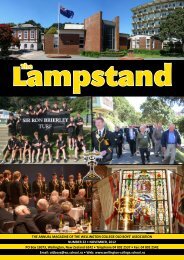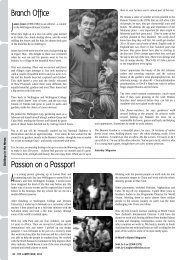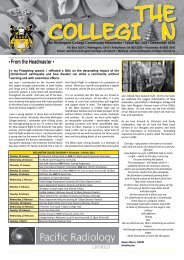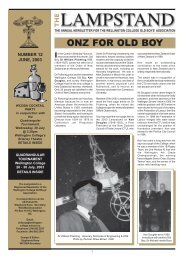Firth House Stories - Wellington College
Firth House Stories - Wellington College
Firth House Stories - Wellington College
You also want an ePaper? Increase the reach of your titles
YUMPU automatically turns print PDFs into web optimized ePapers that Google loves.
A Collection of Memories from former Boarders and <strong>House</strong>masters<br />
conforming to institutional discipline<br />
impossible, while the housemasters tried<br />
to break them in, by “tough love” methods.<br />
A clear demarcation existed between<br />
teacher and student. Boys seen to have<br />
any close relationship with a master were<br />
scorned as “suckers,” just as teachers were<br />
careful not take a special interest in any<br />
boy. Caning was the standard punishment<br />
used to contain misdemeanours, quick,<br />
and easy to administer. Most masters<br />
used this sanction sparingly, but a<br />
sadistic few would inflict red welts and<br />
bleeding from the buttocks. Recalcitrant’s<br />
seldom received sympathy. You took your<br />
punishment like a man, however unjust<br />
and any whinging invited ostracism.<br />
Those who conformed were left alone<br />
but the few who remained on the outer<br />
were persecuted until they either broke<br />
or asked to be withdrawn. One new boy<br />
from Germany was horrifically victimised,<br />
being tormented and beaten up while<br />
dozens of boys consumed by a pack<br />
mentality yelled encouragement. It was<br />
only four years after the Second World<br />
War.<br />
When the rugby season rolled around, I<br />
took to the field in a game amongst the<br />
boarders. My status changed instantly<br />
when they saw how skilfully I played.<br />
Hey, you are pretty good, said one of the<br />
boys who had previously ignored me. Of<br />
my two years at <strong>Wellington</strong> <strong>College</strong>, the<br />
rugby gave me the greatest success and<br />
enjoyment. Playing against many of the<br />
best teams of other colleges at centre<br />
position, I was always the smallest back<br />
and a target for my bigger opponents.<br />
However, I loved this combative game,<br />
despite my lack of physical presence.<br />
Initially I was received with coolness and a<br />
little suspicion since many of the boys had<br />
not previously associated with a Chinese.<br />
Gradually I created my own small circle<br />
of friends, but always felt anxious that I<br />
would be regarded as their second-class<br />
friend. During the second year, I became<br />
more secure in my relationships with<br />
fellow boarders. Those earlier barriers<br />
of race, status and wealth that seemed<br />
insurmountable gradually faded as I came<br />
to see that decent boys did not cease<br />
being so because of their parent’s station<br />
in life. School friendships were sustaining<br />
at the time, but only transient. I knew that<br />
in adult life those privileged boys would<br />
fulfil a destiny to which they were born.<br />
They had been programmed from birth to<br />
enjoy the fruits of wealth, succeed in the<br />
education system, land the best jobs, make<br />
friends amongst their own, marry the most<br />
desirable women, have bright children<br />
and indoctrinate them to perpetuate the<br />
cycle of advantage that was theirs of right.<br />
Struggling outsiders like myself had no<br />
part in their world.<br />
Some evenings the Headmaster Noel<br />
Hogben would visit the boarding house<br />
and chat to some of the boys. Sensing<br />
my insecurity, he alighted on me, and<br />
over several evenings of gentle enquiry<br />
extracted an admission of my not doing<br />
well and feeling ambivalent about his<br />
school. Yet I had tried to present a picture<br />
of normality, a typical boy, well adjusted to<br />
his mates, and getting on with life. That the<br />
Headmaster had penetrated this façade I<br />
found disconcerting as I blurted out how I<br />
felt out of place in <strong>Firth</strong> <strong>House</strong>. The kindly<br />
Headmaster said, Next month there is a<br />
school dance to be held in conjunction<br />
with the Girls’ <strong>College</strong>, which I think you<br />
should attend. I was totally embarrassed,<br />
answering that I could not dance and<br />
would not know what to do. Think about it<br />
for a few days, and let me know, he replied,<br />
in encouraging tones. I should have<br />
accepted his offer but I could not face the<br />
thought of shuffling across the dance floor<br />
to ask a girl to dance, when I did not know<br />
what to do with my feet. What would I say?<br />
For scintillating conversation, would it be<br />
next week’s rugby game or the price of<br />
bananas? Not good enough, I thought.<br />
At <strong>Firth</strong> <strong>House</strong> a church confirmation<br />
class met regularly, and one evening<br />
the Headmaster, a committed Anglican,<br />
came to me with a startling question. Paul,<br />
have you been confirmed? Putting up my<br />
Chinese-boy-from-the-country defence,<br />
I pretended not to understand. Noel<br />
Hogben undeterred, continued saying,<br />
The church. If you were to be confirmed,<br />
it might help you to have a faith to believe<br />
in. This was a moment of philosophical<br />
siege. I would have liked to oblige this<br />
well-meaning and decent mentor, by<br />
agreeing, but spoke my mind, saying, Sir,<br />
I don’t believe in God. The Headmaster<br />
seemed quite taken aback and after a<br />
moment’s thought replied, I shall arrange<br />
for Reverend Temple of St John’s Church<br />
to talk to you. Will you go? I agreed and<br />
attended an unproductive meeting where<br />
the minister exhorted me to “have faith.”<br />
At seventeen I saw little evidence of a<br />
compassionate deity and knew that my<br />
greatest need was faith in myself more<br />
than a mystical god.<br />
As the time for my leaving school<br />
approached, the Headmaster asked what<br />
I intended to do next year. I replied that<br />
I had no idea, and no options. He replied,<br />
I know you have not made the most of<br />
yourself here, but you should continue with<br />
your studies. But how? I asked. I will ask<br />
the careers teacher to arrange an interview<br />
for a Technical Trainee’s position with the<br />
Department of Scientific Research, which<br />
will allow you to further your education.<br />
14<br />
Noel Hogben was as good as his word,<br />
passing instructions to his careers teacher,<br />
and writing to my father in support of his<br />
proposal. Shortly after, I met the careers<br />
advisor, a tall, middle-aged languages<br />
teacher Mr Griffin. His opening words<br />
were, You’re a bit different from the usual<br />
applicants, and it will be harder for you, so<br />
hold your head up and look confident.My<br />
immediate reaction was here we go again,<br />
another racist put down, but on reflection<br />
acknowledged he was doing no more<br />
than reminding me of the realities of my<br />
situation. In retrospect, I had to be thankful<br />
for Headmaster Noel Hogben. He had<br />
been the only teacher to read my troubled<br />
mind, and had tried to give direction to an<br />
aimless youth.<br />
As I walked away from <strong>Wellington</strong><br />
<strong>College</strong>, I was not downhearted. My two<br />
years at <strong>Wellington</strong> <strong>College</strong> had taught<br />
me a great deal. I had seen the face of<br />
the “Establishment,” and how the school’s<br />
traditions groomed the next generation of<br />
achievers. The most favourable scenario<br />
for me would have been to come away<br />
fired with the ambition to join that exalted<br />
group, but I knew that I would need to find<br />
another pathway. Approaching adulthood,<br />
I had been jolted into a sharp awareness<br />
of my own inadequacies. These were an<br />
inhibiting and unjustifiable inferiority<br />
complex, race identity conflicts, social<br />
ineptitude, no goals in life, no appreciation<br />
of my strengths, and no study skills. My<br />
position with the DSIR was confirmed and<br />
I left school determined to fabricate a new<br />
“me.” I did not know how to proceed, but<br />
at least boarding school had taught me to<br />
look after myself.<br />
TIM KERR (1962 - 1966)<br />
Roll Call and Nights Out<br />
One of the worries of the capos running<br />
<strong>Firth</strong> <strong>House</strong> is the matter of us going<br />
AWOL. To restrict us, a roll call<br />
was instituted at mealtimes during the<br />
weekend. It was quite a simple process. All<br />
those who were on leave for that day were<br />
marked off the list. The rest, who were not<br />
on sanctioned leave, sat at the meal tables<br />
and their names were called out and they<br />
simply answered “Yessir” and stuck their<br />
arm up in the air when their name was<br />
called. Foolproof…<br />
However, no one bothered to do a head<br />
count. So, I discovered that I could apply<br />
for – and get - leave from after lunch on<br />
Saturday to after lunch on Sunday. Then, I<br />
could remain in <strong>Firth</strong> <strong>House</strong> and present<br />
myself for the Saturday evening meal<br />
without arousing any suspicion. Now, the<br />
purpose of this self-restricted leave was<br />
quite simple. It was to bypass Saturday<br />
night curfew, which from memory was






